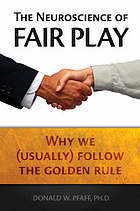Full Download The Neuroscience of Fair Play: Why We (Usually) Follow the Golden Rule - Donald W. Pfaff file in PDF
Related searches:
The Neuroscience of Fair Play: Why We (Usually - Amazon.com
The Neuroscience of Fair Play: Why We (Usually) Follow the Golden Rule
The Neuroscience of Fair Play: Why We (Usually - Goodreads
The Neuroscience of Fair Play by Donald W. Pfaff Ph.D. Audiobook
The neuroscience of fair play: why we (usually) follow the Golden Rule
The Neuroscience of Fair Play - Donald Pfaff - YouTube
The Neuroscience of Fair Play: Why We (usually - Google Llibres
Amazon.com: The Neuroscience of Fair Play: Why We (Usually
The Neuroscience of Fair Play; Why We (Usually) Follow the
The Neuroscience of Fair Play : Why We (Usually) Follow the
The Neuroscience of Fair Play: Why We (usually) Follow the
The (Neuro)science Behind Play: An Essay – PLAYTIME
Previous The Importance Of Play: An Interview with Dr. Jaak Panksepp
A Standards Organization for Open and FAIR Neuroscience: the
Nonfiction Book Review: The Neuroscience of Fair Play: Why We
The Neuroscience of Fair Play Why We (Usually) Follow the
The Science of First Impressions Psychology Today
The Neuroscience of Recalling Old Memories Psychology Today
The neuroscience of fair play is a highly readable and insightful look at brain systems that mediate aggression, fear, compassion, love, judgment, and decision making and determine how we behave, either according to the golden rule or otherwise.
We had just returned from a trip to napa to scout wedding venues. Days later, i learned he’d been cheating on me, and i ended our six-year relationship — the best of my life up to that point — with a two-line email.
Apr 10, 2021 mark your calendars for the 2021 virtual neuroscience fair taking place on saturday, april 10 we will have fun science music and read-alouds in between presentations and activities! 10:20, make a play-doh neuron!.
Pfaff presents a brain‐based model as a neurobiological explanation of behaviour that conforms to the golden rule.
Read 5 reviews from the world's largest community for readers.
In the neuroscience of fair play, donald pfaff takes the reader on a tour showing how neuroscience is beginning to explain the human emotions and behavior.
Do you like to play games or challenge your friends? then check out also, get in on the neuroscience web search treasure hunt and compete for the golden neuron award.
A few years ago, a team of researchers at new york university led by daniela schiller examined the neuroscience of how people form impressions of others.
When it comes to brain development, we know play is essential. The problem is that “play” looks playful even when adults are performing the it's only fair to share.
Brain hormones are a part of this complicated process, and the neuroscience of fair play discusses how brain hormones can catalyze behaviors with moral.
Pfaff, phd the neuroscience of fair play the united nations, new york - september 11, 2009 toward a common morality for more.
Human beings, too, are more likely to treat another person properly if they expect to interact with that person again.
The neuroscience of fair play is a highly readable and insightful look at brain systems that mediate aggression, fear, compassion, love, judgment, and decision making and determine how we behave, either according to the golden rule or otherwise. Donald pfaff is a pre-eminent neuroscientist with the breadth of knowledge and depth of thinking.
The neuroscience of fair play: why we (usually) follow the golden rule. Pfaff, 2007 work in biology, anthropology, economics and neuroscience.
In the neuroscience of fair play, donald pfaff takes the reader on a tour showing how neuroscience is beginning to explain the human emotions and behavior of fear, love, friendship, aggression and violence. Pfaff spends much of the books talking about the genes that lay the tendencies for each of these behaviors.
Coxilino (2016) why therapy works: using our minds to change our brains.
The neuroscience of fair play: why we (usually) follow the golden rule. Author information� psychologist, mood and anxiety disorders program.

Post Your Comments: